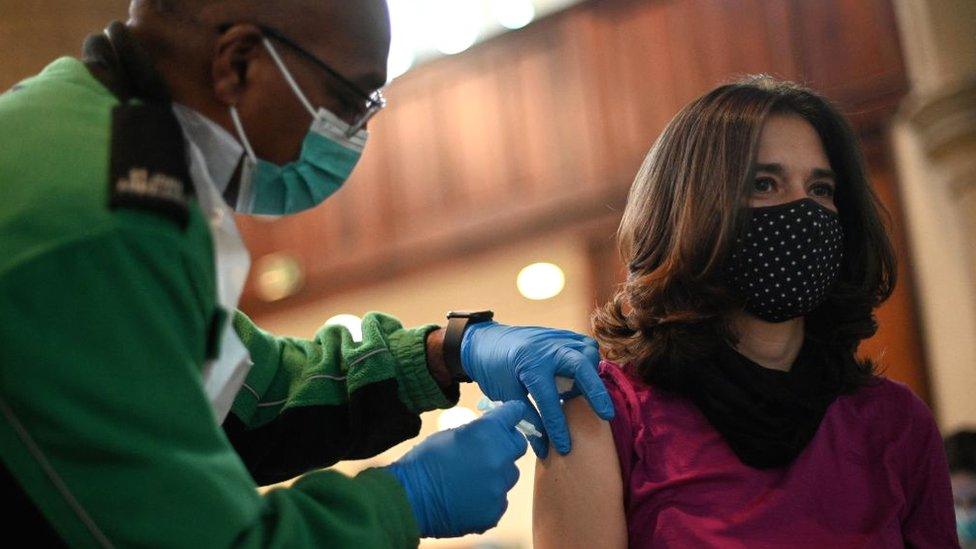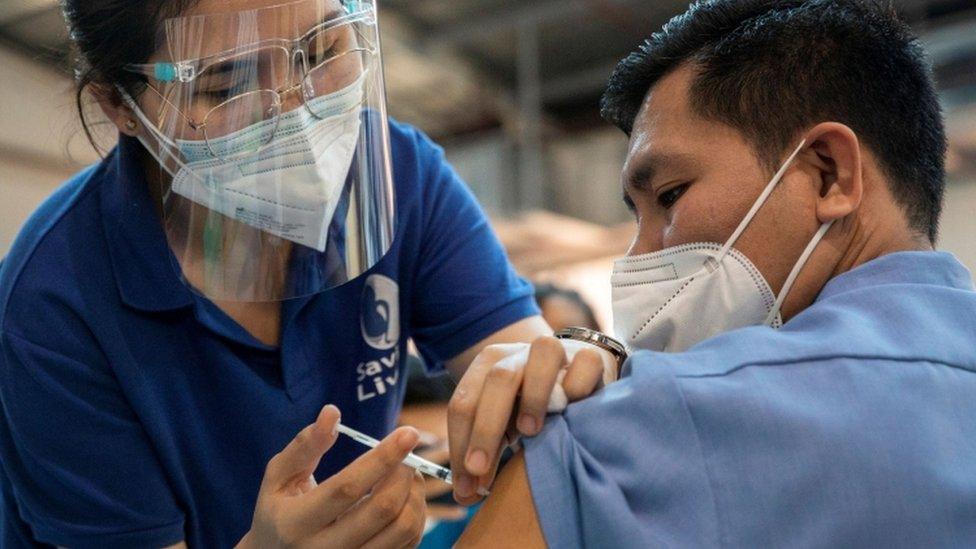Covid: Omicron hospital admissions could reach 1,000 a day - scientific advisers
- Published

Hospital admissions from the Omicron variant may reach at least 1,000 a day in England by the end of the year without extra restrictions being put in place, government advisers have said.
The numbers are contained in leaked minutes of a meeting of the government's scientific advisers held on Tuesday and seen by the BBC.
The overall scale of hospitalisations is still uncertain, they say.
But an urgent response should be considered to reduce the virus spread.
Minsters are due to meet later to consider moving to Plan B in England, a government source has told the BBC. This could mean more people being asked to work from home, further rules on masks and some form of Covid certification.
In the meantime, the government is trying to slow the spread of the Omicron variant so more people can get their booster jabs.
There is growing early evidence that booster vaccine doses could be an effective defence against the Omicron variant, even though it's the most mutated variant of the virus detected so far.
'Consider urgent response'
The Scientific Advisory Group for Emergencies is made up of around 30 scientists who offer advice to the government on how to react to the pandemic in the UK.
In the minutes of their latest meeting this week, seen by the BBC, they say: "With the speed of growth seen, decision makers will need to consider response measures urgently to reduce transmission if the aim is to reduce the likelihood of unsustainable pressure on the NHS."
The scientists say it is "highly likely" Omicron will account for the majority of new coronavirus infections in the UK within "a few weeks".
And they say the peak of the wave is "highly likely to be higher" than 1,000-2,000 Omicron hospital admissions per day without new rules to slow the spread of rising infections.
There are currently around 680 people admitted to hospital each day with the Delta variant in England (latest seven-day average). At the peak of the last winter wave of coronavirus hospitals in England were admitting 3,811 people a day infected with the virus.
What's not yet clear is whether Omicron will replace infections from the older Delta variant or whether both variants will spread concurrently, at least in the short term.
Scientists say that will depend on the degree to which they infect different groups or cohorts of people, which is not currently known.
Clear messaging
The minutes go on to say: "Evidence suggests that measures could be reintroduced with expectation of a similar level of adherence as has been seen in the past. Adherence is likely to be higher if messaging and policy have clear rationales and are consistent."
The advisers also say:
The number of omicron infections in UK is now increasing rapidly, with evidence of community transmission, and hospital admissions from Omicron should be expected to follow soon
Taking measures which slow or delay the wave if infections would allow more time for vaccination including ensuring increasing coverage and boosting with existing vaccines
Vaccine and immune effectiveness against severe disease is likely to remain higher than protection against infection
With the speed of growth seen, decision makers will need to consider response measures urgently to reduce transmission if the aim is to reduce the likelihood of unsustainable pressure on the NHS
A modest reduction in severity of disease from Omicron would not avert high numbers of hospitalisations if growth rates remain high
Given the rapid increase, decision makers will need to consider urgently which measures to introduce to slow the growth of infections if the aim is to reduce the likelihood of unsustainable pressure on the NHS
Related topics
- Published8 December 2021

- Published8 December 2021

- Published8 December 2021
